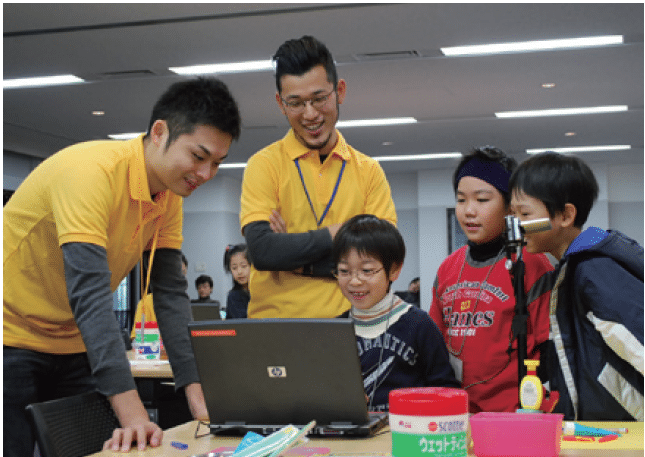MICROSOFT JAPAN NPO COOPERATION PROGRAM
2006–2010
In 2002, Microsoft Japan launched a grantmaking program for Japanese NPOs called the Microsoft Japan NPO Cooperation Program. This program aims to empower nonprofit organizations in Japan through the use of IT. Each year, approximately $180,000 (¥20,000,000) in grants is distributed to Japanese NPOs, together with software and other technical advice as necessary. In the past seven years, almost $1.2 million has been granted to a total of 51 organizations. JCIE began operating this program for Microsoft Japan in 2006, managing the planning, operations, selection process, and evaluation of the program.
In 2009, this program was renamed the Microsoft Japan NPO Cooperation Program (formerly known as the Microsoft Japan NPO Support Program) as a result of discussions about transforming the relationship between the corporate sector and NPOs into a more collaborative partnership. The new program focuses on how the two parties can leverage their respective expertise, and mutually benefit through a win-win relationship. In addition, the focus of the program’s support has expanded to encompass two main themes: (1) projects promoting safe use of the internet, and (2) projects utilizing IT technologies to provide solutions to pressing social issues, especially in the fields of environment and health.

GRANTS LIST
Association for Nature Restoration and Conservation, Japan – Tokyo
The promotion of public education and awareness-raising on the environment through a video blog.
Boramimi Information Bureau- Aichi
The creation of an interactive volunteer resources matching system.
Habataki Welfare Project – Tokyo
The creation of a cooperative portal site on employment for people living with HIV and for businesses.
Pangea – Tokyo
The development of content for simultaneous exchange activities to be conducted by children around the world through ICT.
Yoron Information Group e-OK – Kagoshima
A project to restore the coral reef near Yoron Island by implementing a diver’s log.
Global Children’s Network for Atopic Children – Tokyo
The creation of an information network for managing the risks of food allergies.
e-MADO Comprehensive Care Network for Sick Children – Nagano
A project that uses IT to offer comfort to children who require long-term hospitalization and their families.
Together – Osaka
The development of a model for collaborative manufacturing using IT in workplaces for persons with disabilities.
TRYWARP – Chiba
The promotion of intergenerational exchange through a project in which students provide IT skill training to seniors, and the sharing of this model as a way to contribute to regional revitalization.
Hana Paso – Kyoto
Encouraging the use of a new IT application, “POP’n Shoku” (a combination of digital photography and comical poetry), for the home use of senior citizens.
Public Resource Center – Tokyo
The encouragement of a culture of charitable giving through the development of an employee participation model of an online donation system.
Japan Association for the Promotion of Policy for the Welfare of Persons with Disabilities – Tokyo
The creation of a policy network for the welfare of persons with disabilities in order to ensure that the needs of those with disabilities are reflected in government policies.
Asia Arsenic Network – Miyazaki
The creation of a digital archive to preserve the history of arsenic poisoning in the Toroku and Matsuo mine areas.
Revolve Institution of School Education (RISE) – Ibaraki
The creation of computer-based English learning textbooks for dyslexia students.
Florence – Tokyo
The creation of a web-based physical examination and diagnostic system to help support work-life balance for company employees.
Movements for the Internet Active Users – Tokyo
A project to improve the “information literacy” of Japanese youth concerning usage of the internet.
CANVAS – Tokyo
A project that will collect educational materials on internet security from companies and local governments, and put together a series of workshops to educate children on safe internet usage.
The Sloth Club – Tokyo
A project to launch a country-wide campaign aimed at reducing CO2 emissions and electricity consumption by encouraging a smarter and more efficient lifestyle.
CancerNet – Tokyo
A project to create an online portal with reliable medical and support information for individuals suffering from cancer and their families.
ICT4Everyone – Ehime
A project to develop IT tools to aid children with development or attention disabilities in daily schedule management.
Efforts to Promote Internet Safety
Movements for the Internet Active Users – Tokyo
A project to conduct studies and videos on the positive effects of information and communication technology (ICT) in schools to be broadcast live on the internet.
Content Evaluation and Monitoring Association – Tokyo
A project to provide young people with correct information about copyright laws and illegal downloading of music and videos through instructional tools—such as web, textbooks, and videos—as well as seminars and lectures in schools.
Expanding Possibilities for New IT Activities
A SEED JAPAN – Tokyo
A project to collect young people’s voices through streaming video and social networking sites and allow them to have an influence on policy decision by developing policy recommendation for the Conference of the Parties to the Convention on Biological Diversity held in Nagoya in October 2010.
Boramimi Information Bureau – Aichi
A follow-up project to improve and package the interactive volunteer matching system, developed earlier with the 2007 Microsoft Japan NPO Cooperation grant, for use by other organizations across Japan.
Nonprofit Sharaku – Hyogo
A project to develop an online platform that offers comprehensive travel and accommodation information to promote and expand travel accessibility for disabled or elderly citizens and their caregivers.
Project UI – Shimane
A project to create a model information service for visually impaired individuals using IT as assistive technology, initially offering travel and tourist information.
